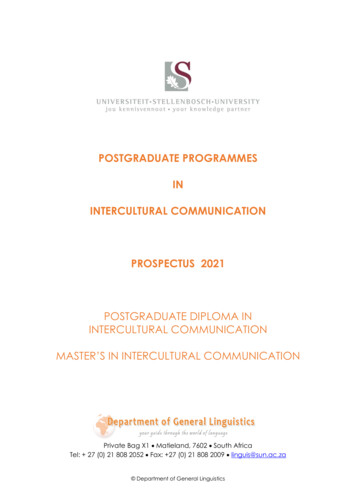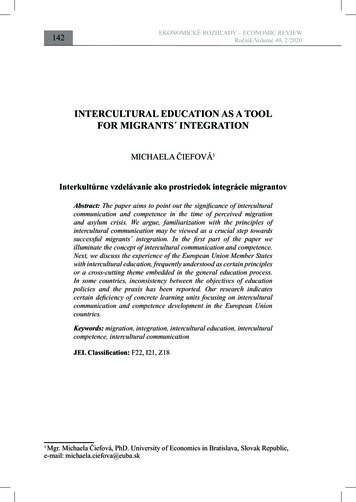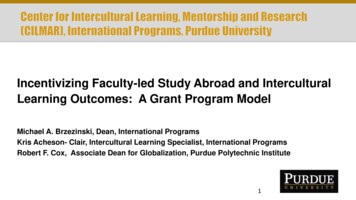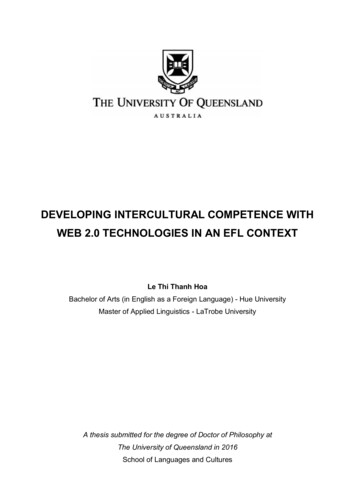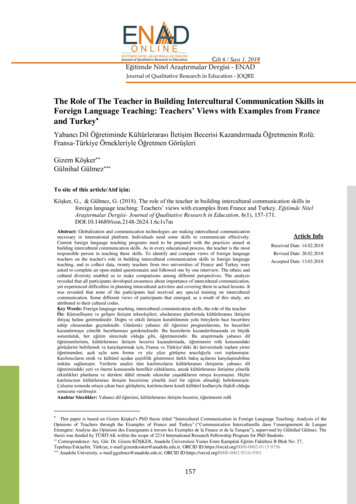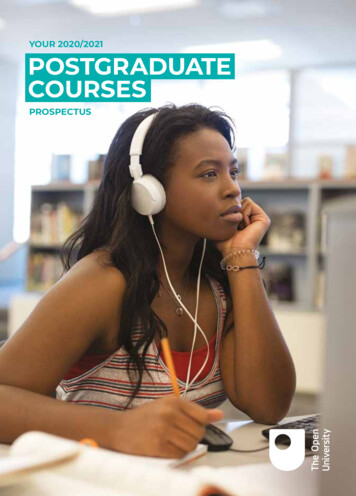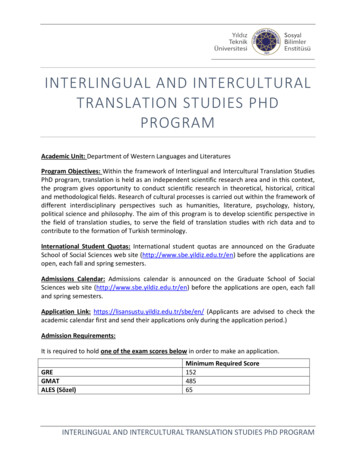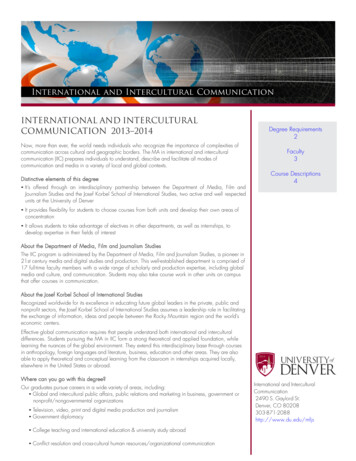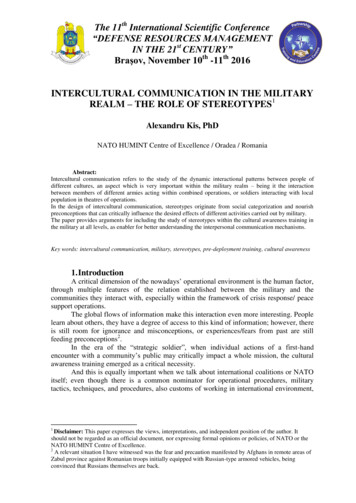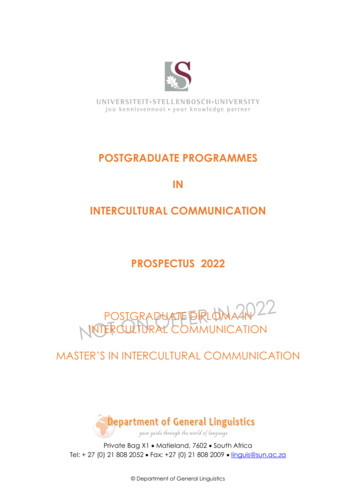
Transcription
POSTGRADUATE PROGRAMMESININTERCULTURAL COMMUNICATIONPROSPECTUS 2022POSTGRADUATE DIPLOMA ININTERCULTURAL COMMUNICATIONMASTER’S IN INTERCULTURAL COMMUNICATIONPrivate Bag X1 Matieland, 7602 South AfricaTel: 27 (0) 21 808 2052 Fax: 27 (0) 21 808 2009 linguis@sun.ac.za Department of General Linguistics
TABLE OF CONTENTSSECTION A: GENERAL INFORMATION. 11.2.3.4.5.6.7.8.9.10.11.GENERAL . 1STAFF PROFILE . 2AIMS . 15MODES OF TUITION . 16LANGUAGE OF TUITION . 17DURATION OF THE PROGRAMMES . 17ACQUISITION OF PRESCRIBED TEXTS . 17FEES. 18BURSARIES . 18APPLICATION AND SELECTION . 18REGISTRATION . 20SECTION B: POSTGRADUATE DIPLOMA IN INTERCULTURAL COMMUNICATION . 211.2.3.4.AIMS . 21REQUIREMENTS FOR ADMISSION . 21STRUCTURE AND CONTENT OF THE PROGRAMME . 213.1Module 1 (30 credits) . 223.2Module 2 (30 credits) . 223.3Module 3 (30 credits) . 223.4Module 4 (30 credits) . 22PROMOTION . 23SECTION C: MASTER’S IN INTERCULTURAL COMMUNICATION . 241.2.3.4.5.AIMS . 24REQUIREMENTS FOR ADMISSION . 24STRUCTURE AND CONTENT OF THE PROGRAMME . 25PROMOTION . 25DOCTORAL STUDIES . 25Private Bag X1 Matieland, 7602 South AfricaTel: 27 (0) 21 808 2052 Fax: 27 (0) 21 808 2009 linguis@sun.ac.za Department of General Linguistics
1SECTION A:GENERAL INFORMATION1.GENERALIn southern Africa, communication regularly takes place across the boundaries drawnby the region’s rich cultural and linguistic diversity. Such communication is found, forinstance, where people with different languages communicate using another sharedlanguage, or where people with the same first language but different culturescommunicate with one another. These and other forms of intercultural communication– which are not limited to southern Africa, but are increasingly found on a global level– occur in a wide range of domains (e.g. health, education, business, public affairs,law, religion, and private life) and often result in misunderstandings across culturescaused by different conceptions of politeness, conversational interaction, etc. Itstands to reason that success in the various domains presupposes an understanding ofthe central features of intercultural communication.Clearly then, there is a great need for postgraduate linguistics programmes in whichthe phenomenon of intercultural communication is studied from a range ofdisciplinary perspectives. The Department of General Linguistics at StellenboschUniversity (henceforth referred to as “the Department”) offers two such programmes,the only ones of their kind in South Africa: (i) a Postgraduate Diploma (PGDip) inIntercultural Communication, and (ii) a Master’s (MA) in InterculturalCommunication. The focus of these two programmes is linguistic in a dual sense –*they are concerned with the linguistic means of intercultural communication, and*they deal with these means from perspectives offered primarily by variouslinguistic (in an inclusive sense) disciplines.The details of the PGDip programme (not on offer in 2022) are given in section Bbelow, and those of the MA programme in section C.The programmes have been designed for (i) professionals who routinely communicateacross cultural and linguistic boundaries or who are responsible for training, educatingand managing others who have to engage in such communication, as well as for (ii)people who have an academic interest in the phenomenon of interculturalcommunication. By providing students with the knowledge and skills needed to gainan understanding of this phenomenon and to manage the relevant differences andresulting misunderstandings in intercultural communication contexts, theseprogrammes enable graduates to practise their (intended) professions with greaterexpertise and satisfaction. At the same time, given their specific content, bothprogrammes are intended to contribute to the strategic priority of understanding,managing and furthering the rich cultural diversity of southern Africa.Since their inceptions in 2005, many people have benefited intellectually andprofessionally from the content of the PGDip and the MA in InterculturalCommunication programmes. The content is continually revised to keep up with newresearch findings and insights, the changing needs of students, and the requirementsof various professions. A number of factors ensure that a high standard is maintained –*Individual supervision: Every student, no matter where he or she lives, receivesintensive personal supervision.
2*Experienced lecturers: The staff has gained a wealth of experience in theirsupervision of hundreds of postgraduate students since 1986.*High-calibre students: Because of their excellent reputations, the programmesattract students who set high standards.*An internationally well-established department: The Department is highlyregarded internationally and is involved in several research and exchangeprojects with foreign tertiary institutions, including universities in England,Sweden and The Netherlands. Staff members also regularly attend and deliverpapers at local and international conferences. The Department's two journals,Stellenbosch Papers in Linguistics (SPiL) and SPiL Plus, are both accredited withthe National Department of Higher Education and publish contributions byleading local and international scholars. Since 2011, these journals have alsobeen available online. Books and monographs by staff members have alsobeen published by respected local and international publishing houses.*External evaluation: The content, organisation, requirements and other aspectsof the programmes are subjected to peer evaluation on a regular basis.A NOTE REGARDING OUR POSTGRADUATE DIPLOMA PROGRAMMES:Since 2019, our two postgraduate diploma programmes (in InterculturalCommunication and Second Language Studies) have been offeredalternately year upon year. In 2022, the Postgraduate Diploma in SecondLanguage Studies programme will be the sole postgraduate diplomaprogramme offered for that year. The Postgraduate Diploma in InterculturalCommunication programme will only be on offer again in 2023*.Please contact the Department for further information before you apply.*This is subject to change at the discretion of the Department of General Linguistics.2.STAFF PROFILEStudents are supervised by the following lecturers in the Department:Dr Kate HuddlestoneSenior Lecturer and Chair of theDepartmentHighest Qualification:PhD (University of Utrecht) entitled“Negative indefinites in Afrikaans”.
3Fields of academic expertise:Language structure, language variation, pragmatics, sign language linguisticsCurrent research projects as at December 2020: Negation in South African Sign LanguageInformation structure in South African Sign LanguageGrammatical and lexical variation in South African Sign LanguageSyntax-pragmatic interface in Afrikaans and South African English (Pragmaticmarkers in Afrikaans & South African English)Recent publications:Huddlestone, K. 2021. Negation and polar question–answer clauses in South AfricanSign Language. Sign Language & Linguistics 24(1).Ssentanda, ME, Huddlestone, K. & Southwood, F. 2019. Curriculum expectationsversus teachers’ opinions and practices in teaching English in rural primaryschools in Uganda. Language Matters 50(2): 141 163.Huddlestone, K. 2017. A preliminary look at negative constructions in South AfricanSign Language: Question-Answer clauses. Stellenbosch Papers in Linguistics 48:93 104.Berghoff, R. & Huddlestone, K. 2016. Towards a pragmatics of non-fictional narrativetruth: Gricean and relevance-theoretic perspectives. Stellenbosch Papers inLinguistics Plus 49: 129 144.Ssentanda, ME, Huddlestone, K. & Southwood, F. 2016. The politics of mother tongueeducation: The case of Uganda. Per Linguam 32(3): 60 78.Huddlestone, K. & de Swart, H. 2014. A bidirectional Optimality Theoretic analysis ofmultiple negative indefinites in Afrikaans. Stellenbosch Papers in Linguistics 43:137–164.Huddlestone, K. & Fairhurst, M. 2013. The pragmatic markers “anyway”, “okay”, and“shame”: A South African English corpus study. Stellenbosch Papers in LinguisticsPlus 42: 93–110.Recent MA supervision: E. de Villiers. 2019. Towards a Minimalist analysis of imperatives in Afrikaans: A firstsurvey of the empirical and theoretical terrain. A. Palmer. 2019. Developing a Sentence Repetition Test for the evaluation ofDeaf children’s use of South African Sign Language. (Main supervisor.) A. Van Niekerk. 2019. A lexical comparison of South African Sign Language andpotential lexifier languages. B Groenewald. 2018. Reconstructing the crime: The use of past tense in “TheMonogram Murders/ Meurtres en Majuscules”. N. Lochner. 2018. “So we were just like, ‘ok’”: The discourse markers like and just inthe speech of young South Africans. S. Strauss. 2017. Afrikaans-English code-switching among high school learners in arural Afrikaans-setting: Comparing the GET and FET phases.
4 JJ. Meyer. 2016. A nominal-shell analysis of restrictive relative clause constructionsin Afrikaans. (Co-supervisor.)Recent completed PhD supervision: D. Nyakana. Multilingual acquisition of determiner phrases in L2 English and L3French by Swahili speakers in Tanzania.A. Gauché. 2017. A relevance-theoretic analysis of selected South AfricanEnglish pragmatic markers and their cultural significance.S. Nakijoba. 2017. Pragmatic markers in Luganda-English bilingual spokendiscourse: A relevance-theoretic approach.Current PhD supervision (as at December 2020):A. van Niekerk. Verb agreement in South African Sign Language.Prof. Manne BylundProfessor and Director of theSU MultiCog LaboratoryHighest Qualifications: PhD 1 (Stockholm University) entitled“Age differences in first languageattrition: A maturational constraintsperspective”. PhD 2 (Stockholm University) entitled“Conceptualización de eventos enespañol y en sueco. Estudios sobrehablantes monolingües y bilingües”.Fields of academic expertise:Psycholinguistics, multilingualism, language and cognitionCurrent research project(s) as at December 2020: Unravelling the multilingual mind Pitch in language and perception Lexical processing and representation in bilingualism Colour terms and colour categorisationRecent completed research projects: Time in language and thoughtLinguistic diversity and motion event cognitionThe effects of age of acquisition and bilingualism on L2 proficiency
5Recent publications:Athanasopoulos, P. & Bylund, E. (In press). Whorf in the wild: Naturalistic evidence fromhuman interaction. Applied Linguistics.Bokander, L. & Bylund, E. (In press). Probing the internal validity of the LLAMA languageaptitude tests. Language Learning.Bylund, E., Gygax, P., Samuel, S. & Athanasopoulos, P. (In press). Back to the future? Therole of temporal focus for mapping time onto space. Quarterly Journal ofExperimental Psychology.Bylund, E., Abrahamsson, N., Hyltenstam, K. & Norrman, G. (2019). Revisiting the bilinguallexical deficit: The impact of age of acquisition. Cognition 182, 45–49.Recent MA supervision: T. Beyers. In progress. Scents and sensitivity: The emotional valence and flexibilityof Afrikaans taste and smell adjectives. T. Collington-O’Malley. In progress. ‘What's in a name?’: Political correctness,euphemism, and the impact of name-words on thought. T. Dick. 2019. Decision making in a second language. J. McLoughlin. 2019. Lexical processing in Afrikaans-English bilinguals (with R.Berghoff). M. Parshotam. 2019. Colour categorisation in isiXhosa.Current PhD supervision (as at December 2020) J. Crossley. The influence of orthography on the mental timeline.S. Gultzow. Motion events in speech and gesture.K. Jonas. The influence of isiXhosa noun classes on cognitive processing.A. Ogelo. Linguistic categories and cognition in Dholu.M.-L. van Heukelum. Syntactic attrition in L1 Afrikaans (with T. Biberauer).Recent completed PhD supervision: R. Berghoff. 2019. Sentence processing in Afrikaans-English bilinguals.
6Prof. Heather BrookesAssociate ProfessorDirector – Child LanguageDevelopment Node (SouthAfrican Centre for DigitalLanguage Resources – SADiLaR)Highest Qualification:PhD (Stanford) entitled “A ContextualStudy of Gestural Communication in aSouth African Township”.Fields of academic expertise:Gesture, interactional linguistics, sociocultural linguistics, ethnographycommunication, multimodal language development, youth languageofCurrent research project(s) as at March 2021: Developing communicative development inventories for South Africa’s officiallanguagesGesture and language development across Romance and Bantu languagesRecent completed research projects: Adapting assessment tools to measure language development in Swedish,SeSotho and SeTswana Speaking children from 8 to 36 monthsUnderstanding of thinking for speaking in Xhosa language speakers learningEnglish in South AfricaGesture and language development in South Sotho speaking childrenThe role of language in the construction of identity and authenticity among maletownship youth: a study of multimodal and multilingual linguistic and discursivepracticesRecent publications:Southwood, F., White, M.J., Brookes, H.J., Pascoe, M., Ndhambi, M., Yalala, S.,Mahura, O., Mössmer, M., Oosthuizen, H., Brink, N., & Alcock, K.J. (In press).Sociocultural factors affecting vocabulary development in young South Africanchildren. Frontiers in Psychology, Section Educational Psychology.Brookes, H.J. (In press). Rethinking youth language practices in South Africa: Aninteractional sociocultural perspective. In Mesthrie, R., Hurst-Harosh, E., & BrookesH.J. (Eds.) Youth language practices and urban language contact in Africa.Cambridge: Cambridge University Press.Mesthrie, R., Hurst-Harosh, E., & Brookes H.J. (Eds.) (In press). Youth languagepractices and urban language contact in Africa. Cambridge: CambridgeUniversity Press.
7Makukule, I. & Brookes, H.J. 2020. The changing status of English in the linguistic andidentity practices of black male township youth in South Africa. World Englishes40(1): 1–11.Brookes, H.J. 2020. Youth language in South Africa: The role of English in South Africantsotsitaals. In Hickey, R. (ed.) English in a multilingual South Africa. Cambridge:Cambridge University Press. pp. 176–195.Brookes, H.J. & Le Guen, O. 2019. Gesture and anthropological perspectives: Anintroduction. Gesture 18(2/3): 119–141.Brookes, H.J. & Le Guen, O. (Eds.) 2019. Special Edition - The Anthropology ofGesture. Gesture 18(2).Brookes, H.J. & Le Guen, O. (Eds.) 2019. Special Edition - The Anthropology ofGesture. Gesture 18(3).Ovendale, A., Brookes, H.J., Colletta, J.M. & Davis, Z. 2018. The role of gesturalpolysigns and gestural sequences in teaching mathematical concepts: The caseof halving. Gesture 17(1): 128–158.Current MA supervision: Martin Mössmer. Language shift and language death in Xri, a Khoekhoelanguage in the Northern Cape, South Africa.Sefela Yalala. Language acquisition in Setswana speaking infants aged 8–18months: Using a communicative development inventory to describe lexicaldevelopment.Current PhD supervision (as at March 2021): N. Buthelezi. Developing MacArthur Bates Communicative DevelopmentInventories (MB-CDI) for isiZulu speaking infants and toddlers. T. Ditsele. Language variation between Sepitori and Tswana in Soshanguvetownship, Tshwane. O. Mahura. 2021. The acquisition of Setswana phonology in children aged 2;0–6;0years. M. Ndhambi. The validation of the Xitsonga MacArthur Bates CommunicativeDevelopment Inventory (MB-CDI) Toddlers’ Form: ‘Words and Sentences’.Recent completed PhD supervision: D. Agyepong. 2018. Cutting and breaking events in Akan. I. Makukule. 2017. The role of language in the performance of authenticity inmale township youth identities in Thokoza.
8Prof. Frenette SouthwoodAssociate ProfessorHighest Qualification:PhD (Radboud University Nijmegen) entitled“SpecificlanguageimpairmentinAfrikaans: Providing a Minimalist accountfor problems with grammatical featuresand word order”.Fields of academic expertise:Child language, language impairmentCurrent research project(s) as at December 2020: Early childhood language development and family socialisation in three SouthAfrican language communitiesTowards a dialect-neutral evaluation instrument for the language skills of SouthAfrican English and Afrikaans-speaking childrenLinguistically fair and culturally relevant early child language assessment:Developing the MacArthur-Bates Communicative Developmental Inventory inseven South African languagesRecent completed research projects:Receptive and expressive activities for language therapyRecent publications:Southwood, F., & White, M.J. (In press). The elicited production of part/whole andgeneral/specific articles by 4- to 9-year-old Afrikaans-speaking and South od, F., & White, M.J. 2020. Fast mapping of Verbs in Afrikaans-speaking childrenfrom low and mid socioeconomic backgrounds and children with hwood, F. & de la Marque Van Heukelum, M.L. 2020. Intercultural communicativecompetence is essential for students of international business – but can it be taught?The case of third-year BCom students. South African Journal of Higher Education34(3): 297–318.
9Southwood, F., Oosthuizen, H. & the Southern African CDI team. 2020. Afrikaansetaalvariasie: Uitdagings vir regverdige meting van jong kinders se taal. SPiL PLUS 59:81–104.Ssentanda, M.E., Huddlestone, K. & Southwood, F. 2019. “800 words in three years”:Curricula expectations versus teachers’ opinions and practices in teaching English inrural primary schools in Uganda. Language Matters 50(2): 141–163.Oosthuizen, H. & Southwood, F. 2019. South Africa. In Law, J., McKean, C., Murphy, C.-A.,& Thordardottir, E. (Eds.) Managing children with developmental language disorder:Theory and practice across Europe and beyond. Oxon: Routledge. pp. 441–450.Haman, E., M. Łuniewska, P. Hansen, H.G. Simonsen, S. Chiat, J. Bjekić, A. Blažienė, K.Chyl, I. Dabašinskienė, P. Engel de Abreu, N. Gagarina, A. Gavarró, G. Håkansson, E.Harel, E. Holm, S. Kapalková, S. Kunnari, C. Levorato, J. Lindgren, K. Mieszkowska, L.Montes Salarich, A. Potgieter, I. Ribu, N. Ringblom, T. Rinker, M. Roch, D. Slančová, F.Southwood, R. Tedeschi, A. Müge Tuncer, Ö. Ünal-Logacev, J. Vuksanović & S.Armon-Lotem. 2017. Noun and verb knowledge in monolingual preschool childrenacross 17 languages: Data from cross-linguistic lexical tasks (LITMUS-CLT). ClinicalLinguistics & Phonetics 31(11–12): 818–843.Recent MA supervision: V. van der Hoven. 2020. The effect of an e-delivered dialogic readingprogramme, for middleclass caregiver-preschooler dyads, on the vocabularyand narrative skills of the pre-schoolers.A. Grové. 2019. The English language abilities of Grade R learners in an Englishmedium South African classroom: Is there a correlation between objectivemeasurements and teacher and parent perceptions?S. Coetzee. 2018. The comprehensibility of plain language for second languagespeakers of English at a South African college of further education and training.M. Manca. 2018. Language attitudes in pre-adolescent multilinguals: Acomparison of five data elicitation techniques.H. Stromvig. 2018. The functions of teacher code switching in classrooms, andteachers’ perceptions towards this practice: A case study of siSwati-Englishinteractions in a semi-urban high school in Eswatini.J. Van Stryp. 2018. The effect of multilingual glossaries of metacognitive verbs onimproving assessment performance in first-year students: a case study at a SouthAfrican university of technology.Current PhD supervision (as at December 2020): M. Kajombo. Communicating cultural taboo and women’s bodies: ASociolinguistic study of speech codes in gynaecological consultations in Blantyre,Malawi (Co-supervisor).A. Nozewu. Investigating the language practices and literacy practices ofisiXhosa families in Western Cape homes: An ethnographic approach (Cosupervisor).Recent completed PhD supervision: M. White. 2018. Processes underlying language development and rate of Englishlanguage acquisition, with specific reference to ELLs in a multilingual SouthAfrican Grade R classroom.
10 S. Nahayo. 2017. Construction of linguistic identities among cross-bordercommunities: The case of Samia of Uganda and Samia of Kenya (Co-supervisor).J. Nel. 2015. The comprehension and production of later developing languageconstructions by Afrikaans-, English- and isiXhosa-speaking Grade 1 learners.Dr Marcelyn OostendorpSenior LecturerHighest Qualification:PhD (Stellenbosch University) entitled“Effects of the second language on thefirst: Investigating the development of‘conceptual fluency’ of bilinguals in atertiary education context”.Fields of academic expertise:Primary: Multilingualism, multimodal discourse analysis, sociolinguistics, language and foodDeveloping interests: decolonial theory, alternative academic writing practicesCurrent research project(s) as at December 2020: Image-ining multilingualism in transformation: The linguistic repertoires ofunderrepresented students in higher education (2017–2021). Funded by the AndrewMellon Foundation small grants (as part of Unsettling Paradigms suprabid) Re-imagining Afrikaans: Past, present and future Politics of the Belly: Language, Food, and Memory in the (Re)construction of SouthAfrican Identity (2020-2022). Funded by the NRF.Recent completed research projects:Semiotic diversity in educational contexts in the Western Cape (2014-2016). Fundedby South Africa’s National Research Foundation (NRF) of Competitive Support forUnrated Researchers schemeRecent publications:Mashazi, S. & Oostendorp, M. (In press.) The interplay of linguistic repertoires, bodiesand space in an educational context. In Purkarthofer, J. & Flubacher, M. (Eds.)Speaking subjects – Biographical methods in multilingualism research. Bristol:Multilingual Matters.
11Oostendorp, M., Duke, L., Mashazi, S. & Pretorius, C. (In press.) When linguists becomeartists: An exercise in boundaries, borders and vulnerabilities. In Bock, Z. & Stroud,C. (Eds.) Recapturing voices in higher education: Contributions from the South.London: Bloomsbury.Oostendorp, M. (In press.) Linguistic citizenship and non-citizens: Of utopias anddystopias. In Williams, Q., Deumert, A. & Milani, T. (Eds.) Multilingualism andlinguistic citizenship: Education, narrative and episteme. Clevedon, UK:Multilingual Matters.Haese, A., Costandius, E. & Oostendorp, M. 2018. Fostering a culture of reading withwordless picturebooks in a South African context. International Journal of Art andDesign Education 37(4): 587–598.Oostendorp, M. 2018. Extending resemiotization: Time, space and body in discursiverepresentation. Social Semiotics 28(3): 297–314.Recent MA supervision: L. Duke. 2020. Decoloniality in academic writing: A South African case study.R. Luizinho. 2020. Constructing first additional language learning: A thematic anddiscourse analysis of CAPS.S. Mashazi. 2020. Linguistic repertoires of underrepresented students: Embodiedexperiences of inclusion, exclusion and resilience.C. Pretorius. 2020. The discursive construction of space at Goldfields Residence.T. Bates. 2019. Linguistic diversity in a rural Northern Cape municipality: Asociolinguistic investigation of Gamagara local municipality.S. Roman. 2019. What Kaaps brings to the table: A sociolinguistic analysis of theintersection between language, food, and identity in Vannie Kaap memes.S.-L. Williams. 2018. The discursive construction of the language ideologicaldebate at Stellenbosch University: A comparison of the English and Afrikaansprinted press.Recent completed PhD supervision: V. Dlamini-Akintola. 2019. The discursive construction of identity in youngoffenders’ narratives in Swaziland.A. Le Roux. 2017. An exploration of the potential of wordless picture books toencourage parent-child reading in the South African context.S. Nahayo. 2016. Construction of language identities among cross-bordercommunities: The case of Samia of Uganda and Samia of Kenya.Current PhD supervision (as at December 2020): R. Abiyo. Literacy practices in and out of school in multilingual Kenya: A casestudy of Tana River County. A. Anthonie. Investigating the potential of heteroglossic teaching and learningpractices in an underrepresented higher education setting: A case study of aSouth African technical and vocational education and training college. L. Hamukwaya. Discourses of and on food among Ovawambo people ofNamibia: An ethnographic study of identity construction. C. Klingbeil. Time, space and identity in Pope memes: A multimodal analysis.
12 A. Nozewu. Investigating the language and literacy practices of isiXhosafamilies in Western Cape homes: An ethnographic approach. S. Roman: Discursive constructions of “colouredness” and memory in food andmemory cookbooks, memes and personal narratives.Dr Lauren MongieLecturerHighest Qualification:PhD (Stellenbosch University) entitled “Thediscourse of liberation: The portrayal ofthe gay liberation movement in SouthAfrican news media from 1982 to 2006”.Fields of academic expertise:Critical Discourse Analysis; language, gender and sexuality; language and socialmedia; intercultural communication in diverse settingsCurrent research project(s) as at December 2020: The representation of beggars in the media The representation of eating disorders on pro-ED websites Interdepartmental research project on homelessness in StellenboschRecent publications:Mongie, L.D. & Plato, T. (In preparation.) ‘Gayle brings the gays together’: A Queeranalysis of linguistic performativity and the construction of identity and belongingthough the use of Gayle. Journal of Language and Sexuality.Mongie, L.D. 2016. Critical discourse analysis as queer linguistics: Religious pro- andanti-LGBT equality framing and counterframing in two letter to the editor in the“City Press”. Stellenbosch Papers in Linguistics 49: 23–43.Mongie, L.D. 2015. The discourse of liberation: Frames used in characterising the gayliberation movement in two South African newspapers. Stellenbosch Papers inLinguistics 46: 67–83.
13Recent MA supervision S. Minnaar. 2019. ‘Have your baby and get out. We need this bed for somebodyelse’: Compassionate intrapartum communication – A discourse analysis oflanguage use during labour in South African public and private maternity settings. M. Mohlomi. 2019. ‘Must they sing ‘Nkosi Sikelel’ iAfrika or must they return fire?’: Acritical analysis of discourses surrounding African migrants on South African onlinenews and Facebook. L. Wilkinson. 2018. ‘Crazy, mad and dangerous’: A critical discourse analysis of the(re)construction of mental illness in South African magazines. N. du Plessis. 2017. Young South African adults’ attitudes towards the use ofobscene language.Current PhD supervision (as at December 2020): M. Kajombo. Taboo language and women's bodies: A sociolinguistic study ofspeech codes used in gynaecological consultations in Blantyre, Malawi.Dr Robyn BerghoffLecturerHighest Qualification:PhD (Stellenbosch University) entitled“Syntactic processing in English–Afrikaansbilinguals”.Fields of academic expertise:Psycholinguistics, multilingualism, language structureCurrent research project(s) as at December 2020:Flipping the switch: Testing structural constraints on the priming of code-switching in highproficiency English-Afrikaans bilinguals (collaboration with Marianne Gullberg, LundUniversity, Sweden; and Gerrit Jan Kootstra, Radboud University Nijmegen, the Netherlands)Recent completed research projects: Sy
Intercultural Communication, and (ii) a Master's (MA) in Intercultural Communication. The focus of these two programmes is linguistic in a dual sense - * they are concerned with the linguistic means of intercultural communication, and . PhD (University of Utrecht) entitled "Negative indefinites in Afrikaans". 3 Fields of academic .
